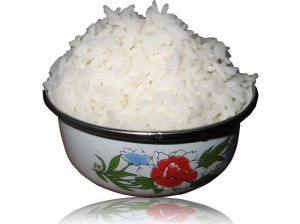
I have a lovely photo of my daughter tasting her first solid food. It was just after Christmas, and she was just over 6 months old. Me: neurotic about potential food sensitivities. Her: eagerly reaching out for the bowl of the stuff that she was actually allowed to put into her mouth and swallow!
We began with sweet potato, and the photo shows my daughter eagerly reaching for the bowl, then looking mystified at the sweet and gummy texture of the food. At least that’s what it looks like she’s thinking.
Rice cereal is often recommended for babies. Mostly this is because it is fortified with iron. A baby is born with stores of iron, but after 6 to 12 months a baby’s iron stores begin to dwindle. Iron is important because it a lack of iron reduces your overall energy and health – vitally important for babies! It helps the body create red blood cells. Iron is also important in healthy brain development.
Iron is especially important for babies who have a low birth weight, who are premature, or whose mothers have diabetes. Rice is also considered to be a fairly non-allergenic food, although rice allergies can be common in Asia, where rice is a regular part of the diet.
As someone who was rather anemic for most of my childhood, I was sold on the benefits of iron-rich rice cereal. I happily made up a mixture of the rather pasty white substance, and my daughter spat the stuff out. Tried again, with the same result. Apparently my culinary magic and persuasive powers were not going to be enough to convince the kid to eat the cereal. I pursued alternatives.
If you’d like to try alternative foods that are rich in iron and not fortified, or if your baby can’t stand rice cereal, there are alternatives. What are they?
• Breast milk: The iron in breast milk is more readily absorbed by your baby’s body than the milk in formula – a reason to continue breastfeeding. It’s important that babies be able to absorb the iron in food, and breast milk makes iron easy on a baby’s tummy. Consider extended nursing or child led weaning to take advantage of the nutritional value of breast milk.
• Winter squash and sweet potatoes, the perfect mashing foods for fall!
• Kelp. My daughter has loved this for years, but it is very, very salty, so it may not be to everyone’s taste.
• Prune juice. This is also good when baby is not particular “regular” with bowel movements.
• Blackstrap molasses. Mix this with fruit in very small quantities.

